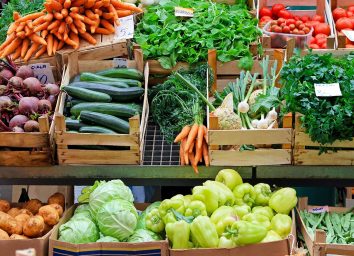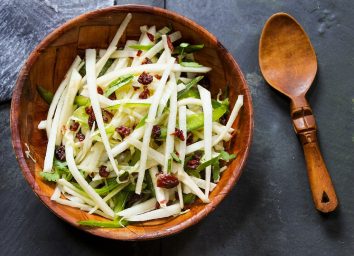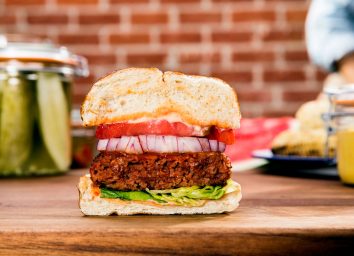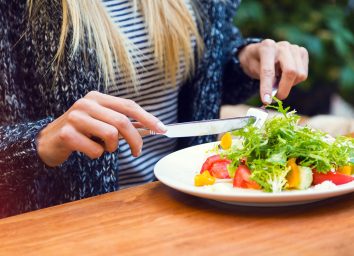Plant-Based Diet vs. Vegan: Learn the Difference from Experts

Chances are, you may have heard someone describe their diet as "plant-based" instead of vegan either on social media or out to eat. With so many ways of characterizing food choices these days, it's easy to get them all confused. So what exactly are the differences between the plant-based diet vs. vegan diet?
What does vegan mean?
While the term was first introduced in the 1940s, veganism's popularity skyrocketed in the 1960s and 1970s. Essentially, it means no dairy or animal products are consumed, including honey.
"I hate to use the word strict," says Susan Tucker, a health coach for plant-based nutrition and wellness and owner of Green Beat Life. "It's the most thorough and strict version of the plant-based diet."
What's the definition of a plant-based diet?
Plant-based has come to mean a diet rich in whole fruits, vegetables, nuts, seeds, and legumes with fish, dairy, or animal protein mixed in sparingly. The inclusion of some red meat, poultry, and other animal protein (like whey protein), means plant-based isn't necessarily vegetarian. Holistic Nutrition Counselor and Ayurvedic Advisor Natasha Uspensky, CHHC, AADP, describes it as similar to the Mediterranean diet, which is high in whole foods and low in poultry, cheese, yogurt, and red meat.
"It's being used a little bit more loosely," Uspensky says. "There isn't necessarily an official definition, but I'd say that's the one that is the most widely agreed upon in the nutrition world."
Are vegan and plant-based the same thing?
Yes and no. Think of it this way—a vegan diet is plant-based, but a plant-based diet isn't vegan. With the occasional grass-fed burger, eggs, cheese, or collagen protein, plant-based can be close, but not fully vegan.
"Sometimes people say I'm vegan but I eat fish twice a week," says Tucker. "I would say that's more plant-based. So people might fall into that category where they're 75 percent plant-based."
What are the health benefits of a vegan diet?
Studies have proven that eating processed meat like bacon or hot dogs every day increases the risk of colon cancer by 18 percent. The World Health Organization has also labeled red meat as a carcinogen, or something that may cause cancer. Not eating meat or dairy has also been shown to reduce the risk of heart disease. "A lot of athletes are going vegan because of the inflammation of dairy and meat," says Tucker. "Dairy for a lot of people is really hard to digest."
Besides health benefits, veganism can also be great for the environment, as eating less meat and dairy means there is less of a demand for it. "The industrial agricultural complex is really one of the worst things for our environment in terms of factory farming," says Uspensky. "So if we're less reliant on animal foods and on factory farming, then that's going to be really great for our environment overall."
The no-animal byproduct approach on a vegan diet can also expand to make-up and other skincare products, household cleaners, and other products. "It can also refer now quite commonly to people that don't wear leather," says Tucker. "So it kind of extends beyond the diet."
What are the health benefits of a plant-based diet?
"If you're decreasing the amount of processed foods and just animal products in general, you can have a healthier profile," says Lara Metz, MS, RDN, CDN. "Maybe you're reducing your risk for cardiovascular disease, diabetes, cancer—it just depends on what you're eating."
But for some people, a minimal amount of animal protein may be beneficial. One person's response to a certain food isn't the same as another's.
"There may be people who have done phenomenally well on a vegan diet for 20 years and suddenly as their hormones are shifting, or their lifestyle is shifting, or even stress levels are shifting, they may find that they'll do better with a little bit of the animal protein added in," says Andrea Moss, a holistic nutrition coach and founder of Moss Wellness. "But the question always comes down to is it truly the best for your body."
What are the risks of a vegan diet?
"A common pitfall when people transition away from eating as much animal protein is that they start to become what we call junk food vegans," Uspensky says. "There are plenty of junk foods out there that are technically vegan, but by no means are they good for you."
This means eating less Impossible burgers and Oreos and more whole plant foods. One way to do this is to be diligent about meals and knowing where the nutrients are coming from. "It does require kind of a lot of a lot of forethought to make sure that you're going to be taken care of," Uspensky says, "so that you don't end up eating bread."
It's also essential to account for a few vitamins and minerals that won't be found in vegetables, fruits, whole grains, and legumes eaten on a vegan diet. "There are very few opportunities in the vegan diet to get naturally-occurring B12," Uspensky says, noting that nutritional yeast is about the only source that isn't fortified. "If something is fortified, then it's probably processed."
Being deficient in other vitamins and minerals like iron, vitamin D, omega-3 fatty acid, and zinc are also a risk, so checking in with a primary care practitioner is strongly encouraged before and during the diet.
What are the risks of a plant-based diet?
"I wouldn't say there are any health risks," Tucker says. "There are risks if you have preexisting conditions and there are health risks if you don't pay attention."
Because a plant-based diet means sometimes getting vitamin B12 from dairy and iron from animal protein, the dietitians say the risks are few and far between. "You're eating a wide range of food," Uspensky says. "You don't really have to be concerned about any nutrient deficiencies."
What is the best way to start a plant-based diet?
"Think about what a typical day looks like for you in terms of your dietary intake," Metz says. "Break it up into each meal and snack and think about what your plant-based foods are typically and how can you increase them."
Meatless Mondays, dairy milk swaps, and focusing on vegetables, whole grains, and fruits at every meal are great ways to start incorporating a plant-based diet into your lifestyle. Metz recommends adding veggies to eggs in the morning for breakfast, having cut-up fruit or vegetables for a snack, and upgrading a boring lettuce/crouton/chicken salad with non-starchy vegetables like cucumbers, broccoli, peppers, and artichokes.
Overall, you want to make sure your body is responding positively to the change. "The best way of knowing if a certain dietary approach is right for you is to try it out for a period of time," Moss says. "You will get feedback from your body. If you're thriving, you're going to know it."








